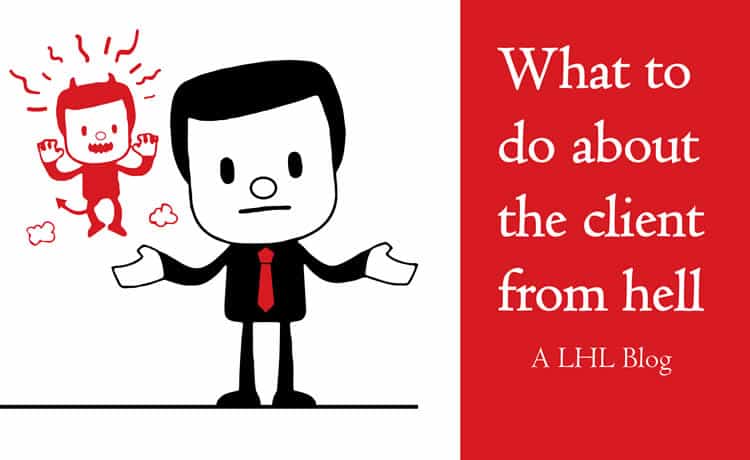Warning: Attempt to read property "roles" on bool in /var/www/vhosts/attorneydocs.com/httpdocs/wp-content/plugins/wp-user-frontend/wpuf-functions.php on line 4663
By Dante James Martinez
You know those people that are hard to deal with? I mean so bad that even having them as a client can hurt your reputation? Of course, you do! You are a legal professional and deal with the most provocative-group of individuals, and sometimes you’ll get the worst. Lawyers are usually clear about their roles concerning representation and guidelines before analyzing the situation at hand, but if your problem is not the case, rather the client, the next steps you take are imperative. These are the five steps:
Establish Authority
Your first step of course is to communicate your value to the client, and that your role is to advise them on the consequences from the different courses of action. It is the lawyers job-not the clients- to decide which course of action to follow. Remind the client that they hired you for your knowledge, and it’s their life, business, litigations, estate, or everything is at stake. If client is completely unwilling to make decisions about their legal issues and offer for you to do it for them, do not. Let another influential person in their life help them with making that decision. Remember, your job isn’t to decide for them, but to help them understand their choices.
Be thorough with documentation
This blatantly means that you should be documenting everything you possible can, including the following: phone calls, voice-mail messages, and email-messages. Every instruction given should be confirmed in writing with proper signatures and include the possible consequences of various courses of action the client may be contemplating. Along with saving this documentation, make proper copies, especially for difficult clients.
Manage Expectations from the Outset
Usually clients have expectations or goals outside the realm of the services you provide, and managing these with a bad client will need to be of utmost importance. Have a frank discussion with your client, as early as possible, and identify what their expectations are pertaining to the issue. If the client has expectations that are outrageously expensive and or completely unrealistic, be clear about whether you can meet that expectation or what alternative will be provided. As always, include the costs that will be involved.
Be Calm and Clear
It’s difficult handling such work, and at times stress can get the best of us, but regardless you know as a legal professional to present yourself in respectable manner; with this said make patience your watchword when handling a difficult client, and do not let the unhappiness take hold. If you do realize that you are depressed from work, take the time to reflect and maybe transfer the file to another applicable lawyer.
Know your boundaries and set your limits
These common confrontations with a bad client can cause you to extend yourself, but you can reduce the many common situation by being prepared beforehand and setting boundaries at the initial engagement. Though this directly ties back in with establishing authority, it should be noted that if a client will not abide by your process or boundaries, he or she should be declined the representation. There’s no reason to tolerate an abusive client.
When it comes to clients, not all are created equal, and sometimes you get both extremes. The distinction between great clients and bad will make you question and enhance your legal skills, but it can take a great effect on your reputation. Once you have a larger understanding of how your practice can influence your clients, it will be the best money you have ever made.








